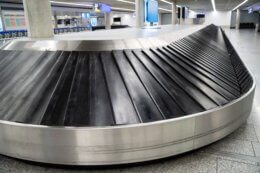
Beautiful home under a flight path? Forget it! Airport noise is a top bugbear for Australians considering where to buy or rent, according to new research from Compare the Market.*
Living close to an airport was second only to living close to a dump, which topped the list of least desirable locations, according to new Compare the Market research.
One in three people said they couldn’t stand the sight or smell of rubbish, while one in five couldn’t put up with airport noise.
Other undesirable spots included graveyards (16.5%), highways (12.3%), railways (6.8%), and even schools (6.2%)—all of which were noted for issues like noise, traffic, and other nuisances.
Top bugbears for Aussies looking to buy or rent:
- Near landfill (the dump): 29.2%
- Next to the airport: 22.1%
- Next to a graveyard: 16.5%
- Next to a highway: 12.3%
- Next to a railway: 6.8%
According to Compare the Market property expert Andrew Winter, understanding what you’re getting into before purchasing a property is essential to avoid buyer’s remorse.
“Since covid many people’s savings buffers have depleted, which doesn’t leave much wiggle room to be a picky buyer,” Mr Winter said.
“For first-time buyers, that probably means adjusting your expectations, working out your top priorities and choosing some areas you’re happy to negotiate on.
“Ask yourself: ‘what can I live without’. Maybe it’s compromising on size so that you don’t have to live near the noisy airport or highway.
“Interestingly, we had someone say they’d hate to live near the beach. Tell you what, if they ever find themselves with a beach house they don’t want, I’ll gladly take it off their hands!
“But in all seriousness, doing your due diligence is key before making an offer on any property. While some factors like highway noise may be obvious, others, like flight paths, are less apparent but can still have a big impact.
“Whether or not these issues are a deal-breaker can also depend on their location and the local market. A busy road in a quiet suburb or acreage location can have a huge negative impact, but traffic noise is part and parcel of living in city and urban environments.
“Even airport noise is accepted as the norm in some areas, if it means you are living in a well-placed, high demand area. Simply consider, ‘are any negatives appropriate for the area?’ If they are, don’t stress too much about them.”
Andrew Winter’s Six Tips for Avoiding a Property Regret
While compromises are often part of buying a first home, there are a few pitfalls that no buyer should ignore. Here are Winter’s top tips for steering clear of a property that could lead to long-term frustration.
- Never Skip Building Reports: An inspection by a licensed professional is a must-have step before purchasing a home. Professional inspectors can uncover issues like structural damage, pest infestations, and water damage that might be hidden from view. Skipping this step can mean costly repairs down the line.
- Request a Suburb Property Report: Many websites, including Compare the Market, offer free suburb reports that provide insights into recent sales, market trends, and even potential flood risks. Additionally, consulting with insurers can reveal other natural disaster risks in the area that may affect your decision.
- Visit the Area at Different Times of Day: The ambience of a neighbourhood can vary dramatically depending on the time of day. Checking out the area in the morning, during rush hour, and on weekends can give you a fuller picture of the noise, traffic, and activity levels near the property.
- Get Pre-Approval Before Making an Offer: Securing a pre-approval from a lender is crucial. Pre-approval will give you an idea about how much you are going to be able to borrow, and if you need to do some renovations, a pre-approval will help you know how much money you might have to do these.
- Exercise Caution in Auction Bidding Wars: Auctions can be exciting but come with high stakes. Unlike private sales, auctions don’t include a cooling-off period, meaning you’re committed once the bid is accepted. Depending on the auction terms, exiting a contract post-auction can result in losing your deposit, paying a percentage of the purchase price, and incurring additional legal fees.
- Consider Long-Term Repair Costs: Renovations and repairs can be costly, especially with recent shortages driving up prices for materials and labour. If urgent repairs are necessary, shop around to find competitive quotes. If the repairs are non-essential, consider waiting for a more favourable market to reduce expenses.
* Based on a survey of 1,006 Australian adults, conducted in October 2024.
For more information, please contact:
Phillip Portman | 0437 384 471 | [email protected]
Compare the Market is a comparison service that takes the hard work out of shopping around. We make it Simples for Australians to quickly and easily compare and buy insurance, energy, and home loans products from a range of providers. Our easy-to-use comparison tool helps you look for a range of products that may suit your needs and benefit your back pocket.








